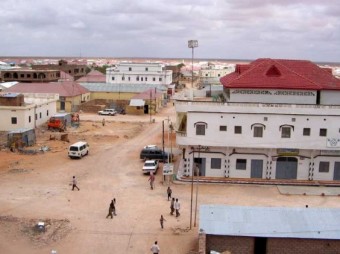Somalia:Report on Humanitarian impact of fighting in Gaalkacyo -OCHA

Following relative calm, the security situation and access in Gaalkacyo has slowly improved since the last Flash Update issued on 8 December 2015.
Of the estimated 90,000 people who were displaced from Gaalkacyo (both IDPs and host community) to nearby villages and internally displaced people settlements, more than 90 percent of internally displaced people and 70 percent of the displaced host community have returned to their settlements and homes, according to the Protection cluster.
Most of the displaced people had sought refuge in nearby villages and internally displaced people’s (IDP) settlements on the outskirts of north and south Gaalkacyo as a result of the armed conflict which broke out on 22 November.
The relative calm and withdrawal of armed elements from both sides (Galmudug and Puntland) encouraged people to return to their homes and businesses.
Temporal and mobile health facilities established at the peak of the emergency have now been closed following the resumption of the provision of health services in all the main hospitals and health facilities in the town.
Humanitarian partners are conducting assessments to ascertain the needs of the vulnerable people who have
returned to their homes and settlements, as well as those who may not have returned due to other reasons. The flow of commercial activities and services between the two sides of the town is gradually returning to normal. Schools have reopened.
The armed conflict which erupted in Gaalkacyo on 22 and 28 November and again on 3 December 2015 left an estimated 35 people dead and another 165 injured, according to local authorities.
Humanitarian impact and needs
An assessment conducted by the Danish Refugee Council in six IDP settlements on 8 December revealed that displaced people lacked access to adequate food and nutrition and that latrines and shelters in most of the visited settlements had been destroyed. The destruction of latrines and shelter raised fears of disease outbreaks and protection concerns including the possible occurrence of sexual and gender based violence.
Public sanitation and water facilities such as elevated water tanks, some belonging to learning institutions, were destroyed or damaged during fighting. Education was also disrupted and the school syllabus delayed by three weeks. Partners also reported increased cases of malnutrition. There were also reports of respiratory and skin infections.
Humanitarian Response and Coordination
As of 15 December, some 20,000 children had reportedly resumed schooling in Gaalkacyo. Education officials in south and north Gaalkacyo in Mudug region confirmed that all the schools have reopened Partners and education officials are carrying out campaigns to encourage parents to take their children back to school.
Humanitarian partners distributed food and non-food items to over 54,000 people in north and south Gaalkacyo, especially the displaced people and vulnerable host community on 15 December. Cash has also been given to over 400 beneficiaries through cash for work programmes and grants to IDPs. Food-for-assets programme is also ongoing.
The humanitarian staff who were temporarily relocated out of Gaalkacyo due to insecurity have now returned.

Humanitarian partners continue to provide life-saving assistance to those in need who were affected by the armed 20,000 children have returned to school since calm returned to Gaalkacyo. An estimated 20,000 children have resumed schooling. conflict in Gaalkacyo. WASH, food, shelter, protection and health remain priority needs.
Shelter partners distributed non-food items to an estimated 23,500 and 31,200 IDPs in north and south Gaalkacyo, respectively, from 11 to 14 December.
The cluster plans to distribute additional non-food items shortly once registration is completed.
The Ministry of Health with the assistance of UNFPA delivered Emergency Reproductive Health (RH) commodities.
These included rape treatment kits that can serve 10,000 people for three months, Clinical Delivery Assistance kits for 30,000 people for three months, drug & disposable Equipment that can serve 15, 000 people for three months and management of complications of miscarriage kits that can serve 30,000 people for three months. Vaginal examination kits are also available for 30,000 people for three months. In addition, 100 dignity kits have been dispatched for distribution to 100 visibly pregnant women who were displaced.
The WASH cluster resumed water trucking to the affected in south Gaalkacyo on 16 December. In addition, 30 new latrines have been rehabilitated in Al-amin1, Afartkaro, Bulo control, Bulbucley, Halaboqad, Margaga, Medina, Mustqbal 2, and Tawakal internally displaced people’s settlements while 16 new latrines were constructed in Kulmiye.
Some 1,500 people also received hygiene kits in Bandiiradley village. Meanwhile, the cluster has recommended the distribution of hygiene kits to 22,000 IDPs and 30,000 people among the host community in north Gaalkacyo.
OCHA led the Regional Inter-Cluster Coordination Group (RICCG) meetings to share information on responses and gaps, and map out the way forward. OCHA is also leading inter-agency coordination to plan and advocate for additional response to emerging gaps. Regional Inter-Cluster Coordination meetings on 16 and 17 December 2015, recommended that clusters in north and south Gaalkacyo conduct reviews and assessments to determine major gaps and challenges that exist at cluster level against the ongoing interventions following the evolving
situations of more returns.
The clusters then conducted the assessments between 20 and 23 December. The findings of the consolidated Rapid Multi-clusters Assessments on Gaalkacyo conflict to determine the challenges that exist at cluster level against the ongoing interventions will be published in the coming days.